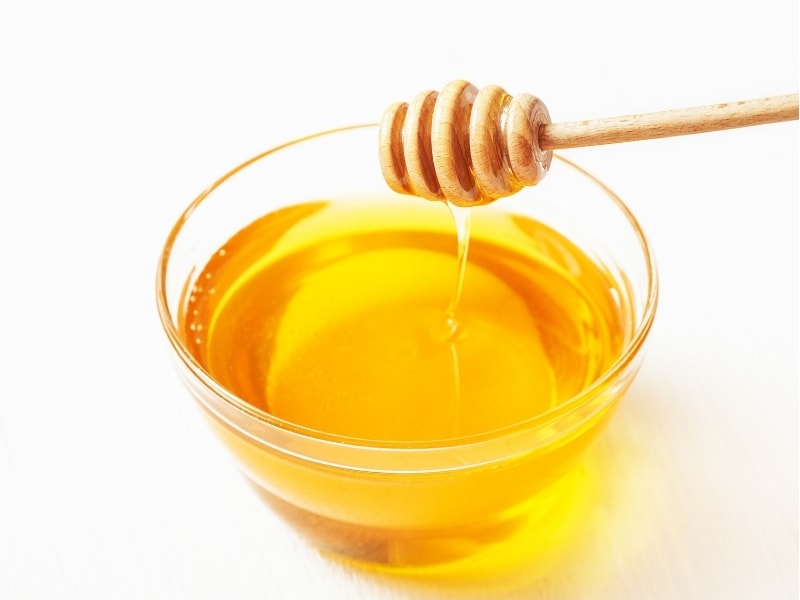Sweet and full of vitamins, minerals, and antioxidants, honey can offer an array of health benefits and if often used to treat various medical problems in people and pets. Whether you use honey just to sweeten your tea, or to soothe a sore throat or cough, you’re probably wondering whether you can share some with your pup.
So, can dogs eat honey? Yes, honey is completely safe for dogs to eat in small amounts. Raw honey has antibacterial and anti-fungal properties and can help reduce inflammation, treat kennel cough, and relieve seasonal allergies in dogs. While safe for adult dogs, puppies, diabetic, and obese pooches shouldn’t eat honey.
In this article, we’ll explain the benefits and downsides of feeding your dog raw honey. Keep on reading to learn how honey can help your pup!
Is Honey Good for Dogs?
In small amounts, honey is completely safe for dogs to eat and can be beneficial for their overall health.
Thanks to its anti-microbial and anti-fungal properties honey is used to treat everything from sore throats and upset stomachs to allergic reactions. Honey also has antibiotic properties which can help heal minor cuts and wounds.
Eating honey in small quantities can offer many health benefits to your dog, but don’t forget that honey is loaded with sugar. Talks with your vet or canine nutritionist before you start feeding honey to your dog.
Note, to take full advantage of everything honey has to offer to your pooch steer clear from highly processed honey products found in most supermarkets. Processing destroys honey’s healing properties, so always choose raw or local honey to reap all the benefits.
Benefits of Honey for Dogs

Due to its many healing properties honey is used as a natural remedy to treat all sorts of medical issues from inflammation to allergies. When fed in small amounts or used topically, honey can offer many health benefits to dogs.
The biggest benefits of adding honey to your dog’s diet are:
1. Honey Can Reliever Seasonal Allergies
Many people believe that honey can help reduce and even cure seasonal allergies in people and pets. This is because raw, locally sourced honey contains the same pollen that is found in the dog’s environment.
Keep in mind, letting your dog eat honey will only help with environmental allergies, and won’t have any effect on food allergies. Thus, if you suspect that your pup has food allergies, take them to the vet to identify the real allergen (source).
2. Honey Can Soothe Digestive Issues
Due to its antibacterial and anti-inflammatory properties, honey may help soothe minor gastrointestinal issues such as gastritis, bacterial overgrowth, and colitis in dogs.
If your dog experiences symptoms of stomach upset after eating grass, feeding them honey can be helpful. However, if your dog’s stomach problems continue, stop feeding honey and take your pup to the vet.
3. Honey Helps Soothe Kennel Cough
Kennel cough is an infectious condition that affects the upper respiratory tract in dogs and is characterized by inflamed bronchi and trachea. If your pooch is suffering from this disease giving them honey can help soothe their throat.
In this case, Manuka honey can prove extremely beneficial and help your dog combat the infection. Manuka honey is a special type of honey that has the highest antibacterial properties of any type of honey and is used for treating everything from sore throat to wounds (source).
Risks of Honey for Dogs

Raw honey can be extremely beneficial for your dog’s overall health, but you should be aware of all potential risks of feeding honey to dogs. Not all dogs can benefit from eating honey, and if your pup falls under one of the following categories they are better off not eating honey!
1. Diabetic Dogs
Honey has a very high glycemic index and is full of natural sugars that are problematic for a diabetic dog. If your pooch has diabetes, eating honey can raise their blood sugar to dangerous levels, putting them at risk of diabetic coma.
2. Dogs with Compromised Immune Systems
Puppies, seniors, and dogs with compromised immune systems shouldn’t eat raw honey, since unfiltered honey contains bacterial spores. While these bacteria can be beneficial for healthy adult dogs they can make puppies and elderly dogs sick.
Before you start feeding your dog honey, talk with your vet to see if your pooch is old enough to enjoy this sweet treat once in a while.
3. Overweight & Obese Dogs
Since honey is chock full of natural sugars and calories, you should use it sparingly. Eating too much honey can be problematic for dogs and lead to weight gain and obesity.
If your pooch is on the chubby side and needs to lose some weight, they shouldn’t eat honey in the first place. In this case, consider putting your dog to a diet and feeding them cucumbers or another healthy, low-calorie treat (source).
How Much Honey Can I Give My Dog?
Pay attention to how much honey you are feeding to your pooch since eating too much isn’t good for your dog or their health. If you want to include honey in your dog’s diet, follow these guidelines:
- Dogs weighing up to 10lbs – ¼ teaspoon of honey per day
- Dogs weighing between 10 and 20lbs – ½ teaspoon of honey per day
- Dogs weighing between 20 and 50lbs – 1 teaspoon of honey per day
- Dogs weighing over 50lbs – up to 2 teaspoons of honey per day
If you think that your pooch can benefit from eating honey, talk with you first. They will be able to tell you if honey is good for your dog and how much you should feed based on their age, size, and dietary needs.
How to Feed Honey to Your Dog?
If your vet said that you can feed your dog honey, you’ll need to find fun ways to incorporate it into your dog’s diet. And don’t forget, only feed raw and locally sourced honey to your pup!
Creative ways to feed honey to your dog are:
- Let your dog lick honey from a spoon
- Dribble honey over your dog’s kibble
- Spread a thin layer of honey over a treat
- Put some honey on a slice of banana, apple, or pear
- Make homemade dog treats using honey, blueberries, and oat flour
Conclusion
Sweet and gooey, honey is completely safe for dogs to eat and can offer many health benefits when consumed in small quantities. Honey is a versatile natural remedy that can soothe your dog’s digestive issues, sore throat and even help cure seasonal allergies.
Don’t forget, puppies, seniors, and dogs with compromised immune systems shouldn’t eat honey, nor should obese or diabetic dogs. But if your pooch is healthy and has a sweet tooth they can eat honey as a tasty and delicious treat.
Related Articles:


0 Comments